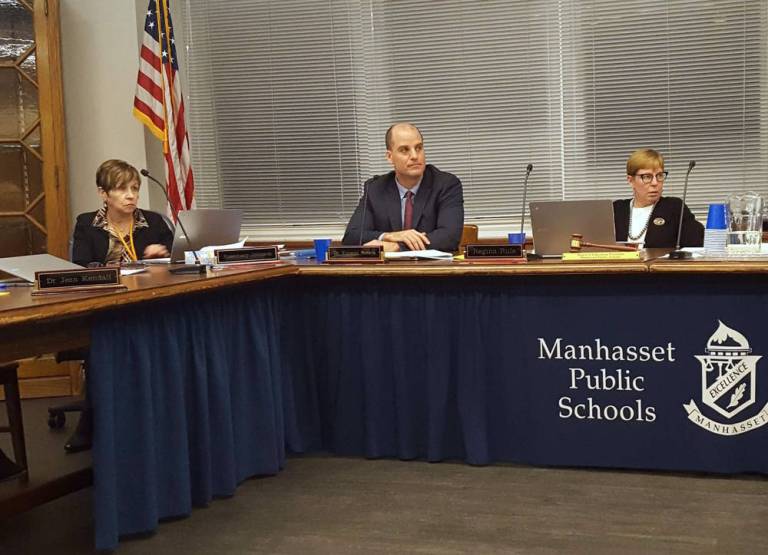
Manhasset Public Schools Superintendent Vincent Butera offered a tentative recommendation Thursday of five projects to be submitted for public vote to earn $4.8 million in capital reserve funding.
The projects are, for Manhasset Secondary School, an elevator and second security vestibule, for Munsey Park Elementary School, a space reconfiguration to add more classrooms and, in Shelter Rock Elementary School, a permanent security vestibule and reconfigured loading dock. They total to just under the $4.8 million limit, Butera said.
That list cuts two projects from the one Butera presented two weeks ago.
Those projects – a technology wing and a social emotional learning wing in the secondary school – could still be partially funded this year depending on the district’s 2019-20 fund balance and any other funds that become available in coming months.
However, it is unlikely that there will be funding for both wings, Butera said.
District architect John Grillo is drafting how the wings could be configured and will investigate the possibility of doing construction in stages, which would allow them to be funded more gradually, Butera said.
“I do believe we will be able to do one of those two other projects, it’s just a matter of which one,” he said.
Grillo will be at the board’s Feb. 7 meeting to go into detail about all of the proposed projects.
The board is also beginning a review of district programs as it prepares to assemble the budget for the 2019-20 school year.
As a part of that preparation, District Coordinator of English Language Arts Rebecca Chowske presented an update on the rollout of the Teachers College Reading and Writing Project in the elementary schools and offered a suggested budget for the continued rollout in upcoming years.
The curriculum, introduced into four classrooms this year, accommodates for different reading skill levels and offers students ample time and resources to engage with books, she said.
Participating schools get book collections that specifically accompany the program.
“Because this is going so well and because we’re getting such positive responses from parents as well as teachers, we want to accelerate this a bit,” Chowske said.
The district intended to roll out the program to all kindergarten through second grade classes in the 2019-20 school year and then add an additional grade during each of the next three school years.
Chowske suggested that it instead be introduced in both third and fourth grade in the 2020-21 school year and then fifth grade in the 2021-22 school year.
Additionally, Chowske said she intends to hire specialists to provide expertise on the curriculum, assist with the roll out and develop relationships with the elementary schools the program is being introduced to.
She recommended that the district budget for two specialists for the upcoming school year rather than just hiring one and waiting until the 2020-21 school year to hire the second.
That would allow each specialist to be designated to a single elementary school from the outset, and the program’s budget would be more level over the next three years, Chowske said.
“A literacy specialist is not only a content person – it’s somebody that has to have profoundly deep relationships with the teachers to be successful,” Chowske said. “[If] they come in at the same time, you’re hitting the ground running, and you’re building the program from a very solid level.”






